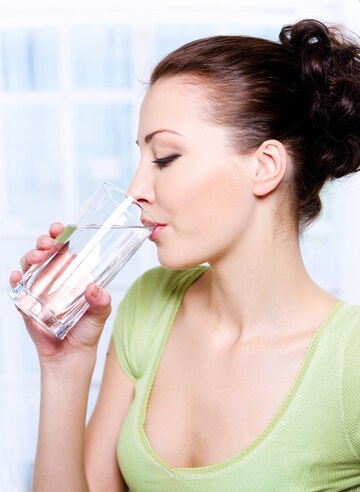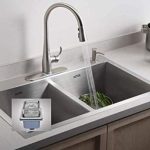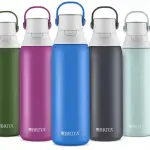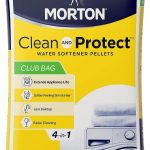All of us have water softeners in one form or another in our homes. But is it safe to drink softened water? That is the question everyone among us keeps asking. Studies have shown that almost 85% of water available in the USA is hard water. So, you need to have a water softener installed. But can you drink softened water? Let us find out.
Yes, most of us can drink softened water with no side effects most of the time. The only change you would notice when drinking hard water and soft water is the taste. Softened water does not contain high or unhealthy levels of sodium and can be easily consumed.
What is Softened Water?
Softened water is the water you get after treating the hard water through different processes to remove harmful minerals such as calcium and magnesium. Hard water is quite difficult to use in cooking or cleaning as it is rich in minerals. Water softeners are used to remove the extra unwanted minerals, and thus, the treated water becomes soft water.
Since many regions in the US have hard water, it is always recommended to use soft water.

Can You Drink Softened Water?
You can definitely drink softened water. In fact, it is considered to be safe to consume softened water, as hard water can have a few health concerns. However, it would largely depend upon the type of water softeners you use. In any case, in most cases, drinking softened water does not have any ill effects on your health and well-being.
If you have any concerns about the sodium added to the softened water during the water softening process, you would be happy to know that water softeners do not add any huge amount of sodium to the water. If you have issues with sodium or any other salts added to water, you can filter the water. But, ideally, sodium added to water during the softening process is not too much. It is safer to drink in many of the cases.
Do Water Softeners Add Sodium to Drinking Water?
Yes, water softeners add a small amount of sodium to water. But, the sodium added to the water is not equivalent to salt. The amount of sodium added to the water depends on the original hardness of the water. If the hardness is more, you will find more sodium is added. The amount of sodium added to the water may rise slightly but lit is always within the safer limits.
The softened water will not taste like salt or sodium when you drink it. However, if you want to reduce the sodium levels in the water, you can consider installing an RO system,. The RO systems can also help you reduce the level of fluoride in water.
What Is The Safe Limit For Sodium in Water?
As per the Environmental Protection Agency (EPA), the permissible sodium limit in drinking water is 20 milligrams per liter (mg/L) for people on very low sodium diets. For normal humans, the level of sodium should never exceed 270 mg/L.
Doctors and nutritionists recommend consuming eight glasses of water per day. If you drink softened water throughout the day and complete this recommended quota, you will drink just three percent of your daily recommended intake of sodium. That should mean drinking softened water does not have any negative impact on your well-being or sodium intake.
The ideal sodium intake recommended through diet is 2400 mg. If you drink eight glasses of softened water, you will be consuming around 160 to 240 mg of sodium. That should again ascertain that drinking softened water is safe for your health.
What Does WHO Say About Softened Water?
As per WHO, there is no firm decision on the use of softened water. There have been no conclusions of any nature on the use of or negative effects of the softened water. There are no guidelines on the use of softened water.
There have been no reports of any health issues arising out of the use of softened water. So, WHO does not have any guidelines issues in this context. However, it is not recommended to use softened water in the baby feeds and those who have sodium-restricted diets. Otherwise, in all other conditions, WHO considers softened water safe to drink.
Some Softened Water Health Myths
There are a few myths about the softened water. These have given rise to the belief that water treatment processes such as reverse osmosis or any other methods are dangerous.
Myth: Salt-based Water softeners add an unhealthy amount of sodium to softened water
Truth: The level of sodium in softened water in your home is just around 50 milligrams per liter of water. In fact, that is the maximum level. Even when your water supply is very hard, and you are using softened water, the sodium intake would be at the maximum level of 240 mg per day. That isn’t even close to 10% of the daily recommended sodium intake.
Myth: Softened water prevents the absorption of other minerals
Truth: Sodium in your softened water is NOT salt. Water softeners remove the minerals like calcium, magnesium, and iron from hard water. But that should not mean your body cannot absorb these minerals in requisite quantity from other sources.
When is drinking soft water not safe?
There are two typical areas where softened water is never recommended. It is not recommended in baby foods and in people who are advised to have a low-sodium diet. For everyone else, softened water should not make any difference healthwise.
Sodium is one of the most important components that our body needs. You get it not only through table salt but also through different food items that we eat on a daily basis. That would make drinking softened water completely safer in most households.
However, softened water is not recommended in the following use cases:
Newborn babies
The softened water should never be used in the food or baby feed you prepare for your little baby. The softened water can have important nutrients imbalanced. The use of soft water, in these cases, will reduce the nutrients that your baby needs to ingest.
People on low sodium diet
People with low blood pressure and other heart issues are typically recommended to consume a low-sodium diet. While the recommended sodium diet for everyone else is 2400 mg per day, for people with a low sodium diet, the recommended sodium diet is way below it. Since softened water consists of sodium – around 50 milligrams per liter – it is never recommended for such people.
The Concluding Thoughts
You can definitely drink softened water. The water softeners do not add any high dose of salt or sodium to the water. If your region gets hard water, it is definitely recommended to use a water softener and soften the water so that it is safe for your body, skin, and hair. Drinking softened water does not have any negative impact on your health.












Add Comment